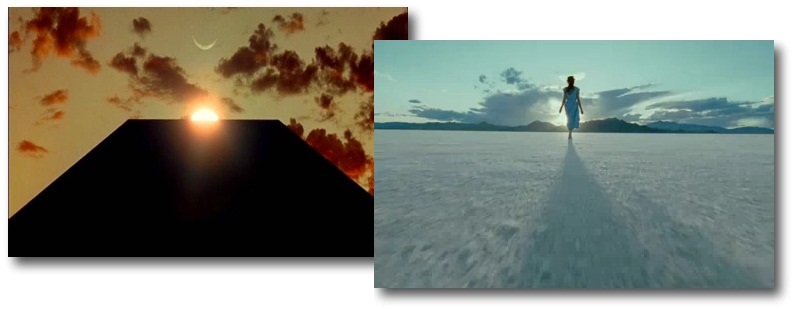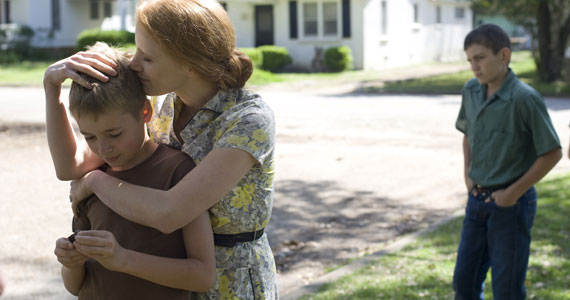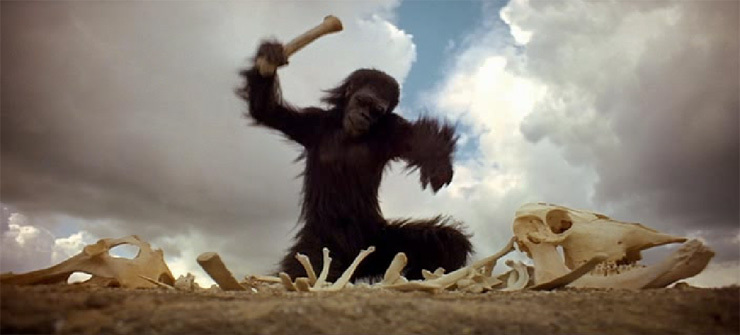Distant Relatives: 2001: A Space Odyssey and The Tree of Life
 Friday, December 30, 2011 at 10:40PM
Friday, December 30, 2011 at 10:40PM Robert here w/ Distant Relatives, exploring the connections between one classic and one contemporary film.

It's not exactly the secret of the cinematic year that Stanley Kubrick's 2001: A Space Odyssey and Terrence Malick's Tree of Life are two films of a similar kind. Indeed as Tree of Life hype grew to its crescendo this past spring and reviews started hitting the web it seemed like almost a requirement for writers to reference the 1968 science fiction classic. There were, I think, three reasons for this. First, which we'll get to shortly, that the two films do indeed have much in common in terms of theme and narrative. Second that both are epic length stories that many cinephiles consider high-water marks in the medium, and finally the involvement of Douglas Trumbull whose special effects work helped realize 2001: A Space Odyssey. When it was announced that he'd be working on The Tree of Life and creating sequences of a cosmic nature, the inexorable relationship between these two movies seemed predestined, and no one had even seen the Malick film yet. But with all the hooting about space and science fiction and experimental narrative and Trumble effects, the connection between 2001: A Space Odyssey and The Tree of Life now feels more like a solid fact to state and less like a flexible area to explore. So let's explore it.
Questions about the meaning of life, ponderances about the origin of the world and wonderment about how it all connects isn't a new or even unusal theme in moviedom. But most of the time, in fact almost all of the time, filmmakers feel the need to create an onscreen surrogate for both themselves and the audience to ask these questions. So most films about the meaning of life involve a solitary figure, a writer or an artist or a chess-playing knight meandering about wondering out loud what it all means. In movies about the meaning of life, it is the goal of the protagonist to find the meaning of life. Not so in The Tree of Life and 2001. While characters do ponder big mysteries, it's the narrative itself that takes us to the origins of creation. And to be clear, I'm using the term "origins of creation" pretty loosely here applying it to both the big bang for The Tree of Life and the early evolution of man for 2001: A Space Odyssey. Events past, much like stars in the sky, seem to be much farther from us and closer to one another than truth would have it. But in each film, the point is the same, that the events that will make up the significant dramatic conflict in the picture mean very little without cosmic context.

This context involves where we've been, where we are, and where we're going, scientifically & religiously speaking. The purpose of showing both the grandeur of the universe and the primal nature of man's past is to suggest our smallness and the smallness of the characters in these films. To them, their lives and their conflicts are the encompass of their universe. But in the scope of history, they are miniscule. Malick and Kubrick do this by creating worlds that at first seem dissimilar but upon further investigation are very alike. If there's any consistent criticism of Stanley Kubrick it's that he is a "cold" director, caring less for his humans than for his technique. 2001: A Space Odyssey plays into the hands of this criticism, featuring stoic human characters and providing our only emotional payoff from the mind of a machine. This seems in great contrast to Malick's film about the daily life, fears, loves and feelings of a family. But Malick's filmography has always presented us with the image of a harmonious world invaded by human violence, apathy, and destruction. The present set segments of The Tree of Life (the ones featuring Sean Penn that have been criticized as a somewhat pointless framing device) show us a world constructed, or is that destructed, by modern technology, and are as cold and austere as anything found in a Kubrick film.
But neither director holds as much ill-will toward the human race as you may suspect. Both films ultimately take us to our unknown future, whether that be the future of one man or all of humanity is, in both cases, ambiguous at best. Interpretations of the "star child" into which astronaut Dave Bowman turns at the end of 2001 are varied and range from the suggestion of alien manipulation to natural evolution to spiritual rebirth. Kubrick's film's finale may generally be considered more atheistic than Malick's but even the then pope (John Paul II, quite the film buff) was said to be a fan and considered the film one of great spirituality. This spirituality is how most people have viewed The Tree of Life's final sequence which presents us with a "heaven" that doesn't exactly adhere to any specific religion's interpretation of such a place, but still seems to present man's ultimate destination as one of great peace, community and beauty. In addition to this, both films seem to view mankind's journey to this ultimate destination as one essentially intertwined with the act of creation and the relationship between the creator and the created, whether it be ape and tool, parent and child, scientist and AI, god and man, and may I add, filmmaker and film. The message seems to be that it is creation that give us meaning, and advances us from insignificantly miniscule and suffering to, ultimately, a state of grace.

Other Cinematic Relatives: Such is the uniqueness of these two films, no other were immediately apparent to me. I'll let you fill in your suggestions in the comments.



Reader Comments (11)
I've always thought it was fascinating that Kubrick dispensed with most of recorded history with that famous jump cut from the Dawn of Man to the space-bound future. When I watch The New World or Tree of Life I feel like I'm watching the "missing pieces" from 2001, so to speak. I don't feel that way about any of Malick's prior films, which are awesome in different ways and for different reasons. He's working on a very specific cosmic wavelength in both those later movies, which you've nicely captured here.
Am I the only one who's not convinced that the scenes on the beach at the end of Tree of Life do not represent the afterlife? From what I remember, which I haven't rewatched since theaters yet, Sean Penn walks around in the desert for a while and then ends up on the beach with his family and others. Everywhere I've read it refers to these scenes as the afterlife. I see it more as taking place within Sean Penn's spirit. He's searching within himself for the entirety of the film, and these scenes represent hi remembering his family and all those that had such a profound effect on the man he's become. He's finding meaning by searching within himself, which I think is the only way to find God; so the film is religious, just not in this overtly afterlife way that everyone thinks. But the film leaves it all open to interpretation, so this is just the way I like to look at it
I hadn't read comparisons to 2001 before seeing Tree of Life, but it was painfully obvious to me. Tree of Life is really all up in 2001's business.
In part, I think it's because neither film intends to be understood in a linear fashion. Both eschew exposition for the most part while showing you the universe. Both intend to create a sense of wonder rather than a "what's going on" narrative. In part, it's because of the very similar ways in which both films use juxtaposition of vastly separate periods of time.
I think it's fair to say that Malick made his own personal 2001, in that he took 2001's frame and told his personal story with it.
Ryan, we weren't sure it was the afterlife, and we weren't sure we were supposed to be sure, if you know what I mean.
i feel tremendous guilt while reading thsi because i suddenly remembered i was supposed to be writing about 2001 myself when i did a Kubrick poll.
I haven't seen that one in far too long but the connections do seem clear. but the difference for me as a viewer i think is that i respond a lot better to the "past" sections of The Tree of Life than to 2001. I am not fully sold / enamored of the present tense or future in ToL but that's the best part of 2001.
Deborah -- and I'm not sure it's supposed to mean that either... at least in the traditional reductive way of "they're in heaven!"
Having watched the film a few times now, I think it's pretty clear that Sean Penn is not dead at the end of Tree of Life. He's had an epiphany or a spiritual awakening or a moment of enlightenment or whatever you want to call it, and the beach sequence is a representation of that visually.
And btw, after my first viewing I thought he definitely WAS dead, so it's not like it's not open to different interpretations.
I also thought it was odd that so many critics easily interpreted the Tree of Life ending as heaven (which is why I felt the need to use quotation marks). After all, a desert with people wandering around aimlessly doesn't exactly say eternal paradise to me. But I think we can at least agree that it's meant to be some ultimate state of grace.
The ambiguity is why I think it matches so well with the star child from 2001, since that image doesn't quite accurately represent any concept of evolution or reincarnation. It's as if Kubrick and Malick are saying the next destination of humanity won't fit into any box of science or religion you may have constructed to try to understand it. Or to put it a prettier way: "There are more things in heaven and earth than found in your philosophy, Horatio"
I went to a screening of "2001" at the SF Museum of Modern Art this week, and when it was done, all I could think was "I want to see 'Tree of Life' again." I'm so glad someone else made this connection exactly as I was thinking about them! And while I'm interested in the similarities, I'm even more interested in the differences... Kubrick's aesthetic is cold and hard, while Malick's is soft, earthy. They approach such similar themes from such singular artistic standpoints.
Seeing relatives this holiday season who I don't see all year has given me the chance to talk movies with fellow film lovers and I always seem to bring up Tree of Life. I like recommending it to people because it's a piece of art worth viewing, but I have a hard time trying to explain what the film's about without mentioning how similar it is to 2001. I'm glad someone finally pointed out how similar the two films really are. This was a great read.
I think the main reason people considers 2001 to be "colder' than ToL is the voice-over. In 2001, it contains as little dialogue as possible, while in ToL it's more like someone looking back at their past and comment how they feel about it. I totally agreed with Jessica Chastain's interview the other day when she said that watching ToL was kind of watching homemade video, that's exactly how I feel about the film, or at least about what Malick intended to do.
Those 2 movies are masterpieces btw, really unique work of art!